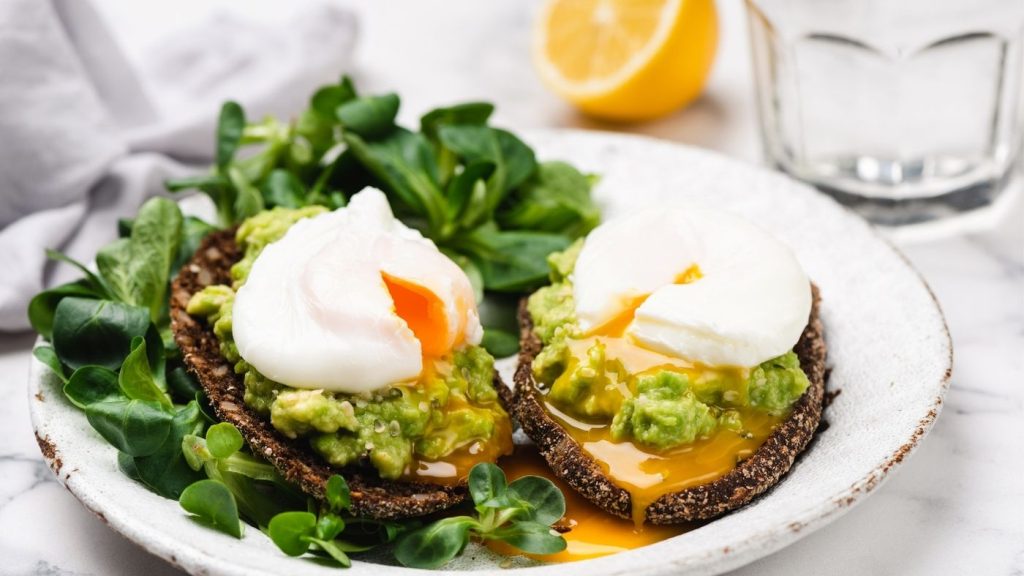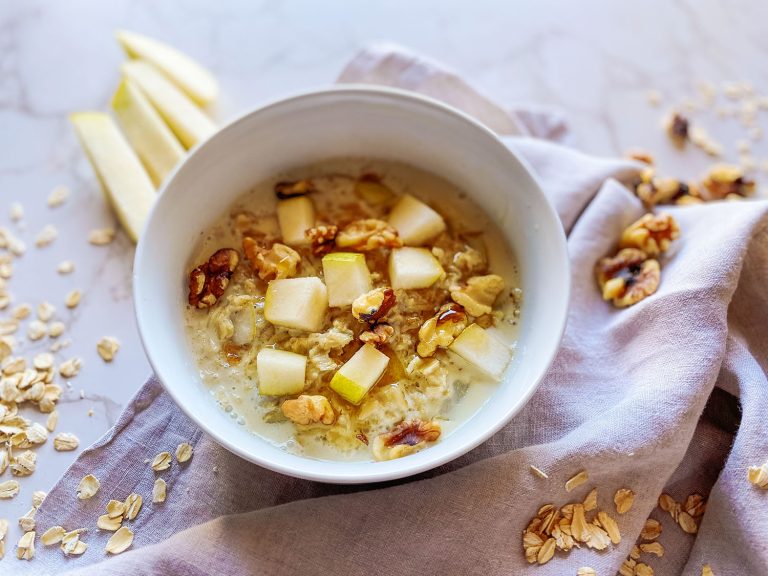That uncomfortable burning feeling in your chest known as acid reflux or GERD can be largely impacted by your food and nutrition choices. For many individuals that experience GERD, food can often be seen as that unwanted enemy. Fearful that even the smallest discretion is going to precipitate a flare-up. While living with GERD may seem daunting and quite impossible some days, it does not have to. Fortunately choosing the right foods in the right amounts and at the right times can dramatically reduce your GERD symptoms and improve your quality of life.
The why
One of the main reasons the reflux sensation happens in individuals with GERD is that the lower esophageal sphincter (LES) is weakened or damaged. Normally the LES closes to prevent food in the stomach from moving or backing up into the esophagus. With GERD, regurgitated food is very common and long-term can result in uncomfortable symptoms including heartburn and pain in the upper abdomen1.
What you can do during a flare
Fortunately, diet and lifestyle modifications are often the first-line treatment in helping to control GERD. Eating the right types of foods in the right amount and at the right times is imperative for controlling reflux symptoms. While there is no one-size-fits all approach to the dietary management of GERD, nor is there a magical nutrition-related cure, fortunately, research has supported common themes and has identified specific foods that may hinder or help GERD symptoms.
Foods that may exacerbate your GERD symptoms and ideally most individuals should limit and avoid specific triggers including2:
- High-fat and greasy, fried foods such as French fries and donuts as these foods have been found to delay gastric emptying
- Caffeinated beverages including coffee and tea
- Chocolate which contains methylxanthine and causes muscles to relax and lowers the LES pressure
- Peppermint, including herbal mint tea
- Carbonated beverages
- Alcoholic beverages
- Citrus and tomato products as these foods may cause further irritation to damaged esophageal muscosa
- Dairy products including milk and cheese
If you are experiencing a GERD flare-up, it is likely not necessary to cut out all of these foods and beverages entirely, versus cutting back and limiting throughout the day while finding appropriate food and beverage substitutes that you are able to tolerate.
Focus your attention also on what to include. Foods to choose most of the time and during a flareup3:
- Fruits (except citrus). Opt for berries, bananas, mangoes, melons, among many others. Fresh and frozen are fantastic and rich in important antioxidants to keep you healthy and strong
- Vegetables including leafy greens, broccoli, cauliflower, asparagus, carrots, to name a few
- Lean protein sources including skinless poultry, eggs, beans, lentils, and tofu. Consider using turkey in place of beef for burgers or taco meat
- Complex carbohydrate sources including oats, whole grain breads, rice, and couscous
- Smoothies
- Healthier fat sources including olive oil, sesame oil, nut butters, and avocado
It is important to also note that while none of the foods listed above will cure your symptoms these foods may be effective for controlling your GERD symptoms.
Other beneficial strategies for the management of GERD

On a daily basis, a dietary pattern similar to the Mediterranean diet may be helpful for managing and lessening your GERD symptoms. The Mediterranean diet includes many plant-based foods such as whole grains, vegetables, legumes, fruit, nuts, herbs, and healthy cooking fats such as olive oil. Red meat, deep-fried foods, and foods high in added sugars such as sodas and desserts are consumed very seldom. The Mediterranean Diet also boasts other health advantages including helping individuals achieve and maintain a healthier weight, improving blood sugar levels, and also optimizing cardiovascular function4. Meal ideas that are in line with the Mediterranean diet and may help control reflux symptoms include:
- oatmeal with ground flaxseed, fresh berries, and a spoonful of nut butter for topping
- low sugar, whole-grain cereal with a fortified milk alternative (soy milk, oat milk), and sliced banana
- scrambled veggies and eggs on a slice of whole-grain toast
- salmon with whole-grain couscous or barley
- vegetable salad with grilled chicken, sliced olives, and hummus
- turkey burger on a whole grain bun with baked sweet potato wedges
Snack ideas include:
- homemade trail mix with unsalted pumpkin seeds, nuts, and dried cherries
- celery with almond butter and sliced apples
- homemade smoothie (see recipe below)
- frozen fruit sorbet (blend frozen berries in a food processor with a splash of fortified milk alternative and a dash of honey)
Other nutrition-related strategies that may be helpful for the management of GERD include5:
- Avoid eating immediately before bed. When you lady down, the ability of the LES to prevent stomach contents from traveling up the esophagus decreases
- Maintain an upright posture during meals and at least 45-60 minutes after eating
- Eat smaller more frequent meals and snacks throughout the day versus large meals
- Include liquid snacks such as smoothies, which are typically easier to digest
- Achieve and maintain healthy body weight. If you are not at a healthy weight, consider working at gradual intentional weight loss
- Keep a daily food journal jotting down what you eat, meal time, and any negative side effects to help better identify any specific food triggers that you may be experiencing

Acid Reflux Friendly Smoothie Receipe
If you are experiencing a GERD flare-up, consider trying this sample nutrient-rich smoothie as a small mid-day meal or snack:
-1 cup non-dairy milk alternative such as fortified soy milk or oat milk
-1 medium banana, frozen
-1 tbsp nut butter (almond butter or peanut butter with no added sugars or oils)
-½ cup frozen berries of choice (blackberries, raspberries, strawberries)
-1 handful of fresh spinach or another leafy green (kale, bok choy)
-1 cup ice
Optional nutritious add-ins: ground flaxseed, chia seed, nutritional yeast
Directions: blend all ingredients until smooth and enjoy in small sips
Lastly, it is often most helpful to work closely with your medical provider and consider consulting with a Registered Dietitian for more individualized nutrition recommendations to better control your GERD.
References:
- https://pubmed.ncbi.nlm.nih.gov/25965127/
- https://badgut.org/information-centre/health-nutrition/diet-and-gerd/
- https://aboutgerd.org/treatment/diet-lifestyle-changes/diet-changes-for-gerd/
- https://www.mayoclinic.org/healthy-lifestyle/nutrition-and-healthy-eating/in-depth/mediterranean-diet/art-20047801
- https://www.sciencedaily.com/releases/2021/01/210105104837.htm




